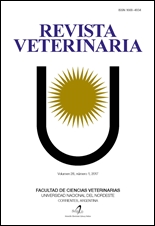Autochthonous yeasts as growth factor in Rhamdia quelen: preliminary approaches
DOI:
https://doi.org/10.30972/vet.2811296Palavras-chave:
Pez Rhamdia quelen, Candida tropicalis, prebiótico, acuiculturaResumo
Rhamdia quelen is an autochthonous fish used for aquaculture in the Northeast of Argentina. Antibiotics as growing factors in fish production had been criticized in the last years and the use of microorganisms emerged as a putative replacement. The aim of this study was to isolate autochthonous yeasts from R. quelen and to evaluate the effect of the administration over biometrical parameters of larvae under intensive culture system. Fungi were isolated from the digestive tract of wild specimens, phenotypically identified and evaluated on their ability to exert beneficial properties. One selected fungal isolate was administered, four times a day, dead or alive at 1 or 2% together with balanced feed to R. quelen larvae for 15 days. aftertreatment larvae were counted and weighted in order to obtain the values of survival, mean weight and total biomass. Only four Candida tropicalis isolates were obtained. None of them expressed beneficial properties. One fungal isolate was randomly selected for in vivo assays. Results indicated that only dead yeast at 1% induced a significant increment of biomass when compared with the control group (p<0.05). Survival rate was boosted significantly (p<0.05) with dead yeast and not significantly (p>0.05) with the fungal isolate. None of the treatments induced significant increments in mean weight (p<0.05). These results allowed us to propose the treatment with dead yeast at 1% as a growing factor for R. quelen, considering this microorganism as an effective prebiotic in the aquaculture of this specie.Downloads
Downloads
Publicado
Como Citar
Edição
Seção
Licença
Política de acceso abierto
Esta revista proporciona un acceso abierto inmediato a su contenido, basado en el principio de que ofrecer al público un acceso libre a las investigaciones ayuda a un mayor intercambio global de conocimiento. La publicación por parte de terceros será autorizada por Revista Veterinaria toda vez que se la reconozca debidamente y en forma explícita como lugar de publicación del original.
Esta obra está bajo una licencia de Creative Commons Reconocimiento-NoComercial 4.0 Internacional (CC BY-NC 4.0)










.jpg)
.jpg)



